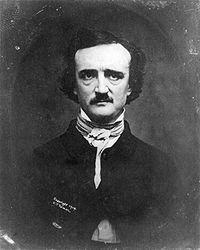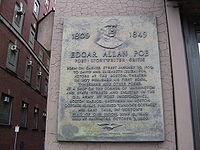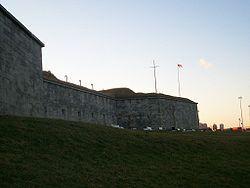Complete Stories And Poems Of Edgar Allan Poe (167 page)
Read Complete Stories And Poems Of Edgar Allan Poe Online
Authors: Edgar Allan Poe
Tags: #Mystery, #Fantasy, #Horror, #Collections, #Poetry, #Classic

Than artless accents such as thine
Whose echoes never flee!
Ah! how for thy sweet voice I pine:—
For uttered in thy tones benign
(Enchantress!) this rude name of mine
Doth seem a melody!
The Village Street
In these rapid, restless shadows,
Once I walked at eventide,
When a gentle, silent maiden,
Walked in beauty at my side.
She alone there walked beside me
All in beauty, like a bride.
Pallidly the moon was shining
On the dewy meadows nigh;
On the silvery, silent rivers,
On the mountains far and high,—
On the ocean’s star-lit waters,
Where the winds a-weary die.
Slowly, silently we wandered
From the open cottage door,
Underneath the elm’s long branches
To the pavement bending o’er;
Underneath the mossy willow
And the dying sycamore.
With the myriad stars in beauty
All bedight, the heavens were seen,
Radiant hopes were bright around me,
Like the light of stars serene;
Like the mellow midnight splendor
Of the Night’s irradiate queen.
Audibly the elm-leaves whispered
Peaceful, pleasant melodies,
Like the distant murmured music
Of unquiet, lovely seas;
While the winds were hushed in slumber
In the fragrant flowers and trees.
Wondrous and unwonted beauty
Still adorning all did seem,
While I told my love in fables
‘Neath the willows by the stream;
Would the heart have kept unspoken
Love that was its rarest dream!
Instantly away we wandered
In the shadowy twilight tide,
She, the silent, scornful maiden,
Walking calmly at my side,
With a step serene and stately,
All in beauty, all in pride.
Vacantly I walked beside her.
On the earth mine eyes were cast;
Swift and keen there came unto me
Bitter memories of the past—
On me, like the rain in Autumn
On the dead leaves, cold and fast.
Underneath the elms we parted,
By the lowly cottage door;
One brief word alone was uttered—
Never on our lips before;
And away I walked forlornly,
Broken-hearted evermore.
Slowly, silently I loitered,
Homeward, in the night, alone;
Sudden anguish bound my spirit,
That my youth had never known;
Wild unrest, like that which cometh
When the Night’s first dream hath flown.
Now, to me the elm-leaves whisper
Mad, discordant melodies,
And keen melodies like shadows
Haunt the moaning willow trees,
And the sycamores with laughter
Mock me in the nightly breeze.
Sad and pale the Autumn moonlight
Through the sighing foliage streams;
And each morning, midnight shadow,
Shadow of my sorrow seems;
Strive, O heart, forget thine idol!
And, O soul, forget thy dreams!
‘Tis said that when
The hands of men
Tamed this primeval wood,
And hoary trees with groans of wo,
Like warriors by an unknown foe,
Were in their strength subdued,
The virgin Earth
Gave instant birth
To springs that ne’er did flow—
That in the sun
Did rivulets run,
And all around rare flowers did blow—
The wild rose pale
Perfumed the gale,
And the queenly lily adown the dale
(Whom the sun and the dew
And the winds did woo),
With the gourd and the grape luxuriant grew.
So when in tears
The love of years
Is wasted like the snow,
And the fine fibrils of its life
By the rude wrong of instant strife
Are broken at a blow—
Within the heart
Do springs upstart
Of which it doth now know,
And strange, sweet dreams,
Like silent streams
That from new fountains overflow,
With the earlier tide
Of rivers glide
Deep in the heart whose hope has died—
Quenching the fires its ashes hide,—
Its ashes, whence will spring and grow
Sweet flowers, ere long,—
The rare and radiant flowers of song!

1848 daguerreotype of Poe
Born
: January 19, 1809(1809-01-19), Boston, Massachusetts,
USA
Died
: October 7, 1849 (aged 40), Baltimore, Maryland,
USA
Occupation
: Poet, short-story writer, editor, literary critic
Genres
: Horror fiction, Gothic romance, crime fiction, detective fiction
Literary movement
: Romanticism
Spouse
: Virginia Eliza Clemm Poe
Edgar Allan Poe
(January 19, 1809 – October 7, 1849) was an American writer, poet, editor and literary critic, considered part of the American Romantic Movement. Best known for his tales of mystery and the macabre, Poe was one of the earliest American practitioners of the short story and is considered the inventor of the detective-fiction genre. He is further credited with contributing to the emerging genre of science fiction. He was the first well-known American writer to try to earn a living through writing alone, resulting in a financially difficult life and career.
He was born as Edgar Poe in Boston, Massachusetts; his parents died when he was young. Poe was taken in by John and Frances Allan, of Richmond, Virginia, but they never formally adopted him. After spending a short period at the University of Virginia and briefly attempting a military career, Poe parted ways with the Allans. Poe’s publishing career began humbly, with an anonymous collection of poems,
Tamerlane and Other Poems
(1827), credited only to “a Bostonian”.
Poe switched his focus to prose and spent the next several years working for literary journals and periodicals, becoming known for his own style of literary criticism. His work forced him to move between several cities, including Baltimore, Philadelphia, and New York City. In Baltimore in 1835, he married Virginia Clemm, his 13-year-old cousin. In January 1845, Poe published his poem “The Raven” to instant success. His wife died of tuberculosis two years later. He began planning to produce his own journal,
The Penn
(later renamed
The Stylus
), though he died before it could be produced. On October 7, 1849, at age 40, Poe died in Baltimore; the cause of his death is unknown and has been variously attributed to alcohol, brain congestion, cholera, drugs, heart disease, rabies, suicide, tuberculosis, and other agents.
Poe and his works influenced literature in the United States and around the world, as well as in specialized fields, such as cosmology and cryptography. Poe and his work appear throughout popular culture in literature, music, films, and television. A number of his homes are dedicated museums today.
Early life

This plaque marks the approximate location where Edgar Poe was born in Boston, Massachusetts.
He was born Edgar Poe in Boston, Massachusetts, on January 19, 1809, the second child of actress Elizabeth Arnold Hopkins Poe and actor David Poe, Jr. He had an elder brother, William Henry Leonard Poe, and a younger sister, Rosalie Poe. Edgar may have been named after a character in William Shakespeare’s
King Lear
, a play the couple was performing in 1809. His father abandoned their family in 1810, and his mother died a year later from consumption. Poe was then taken into the home of John Allan, a successful Scottish merchant in Richmond, Virginia, who dealt in a variety of goods including tobacco, cloth, wheat, tombstones, and slaves. The Allans served as a foster family but never formally adopted Poe, though they gave him the name “Edgar Allan Poe”.
The Allan family had Poe baptized in the Episcopal Church in 1812. John Allan alternately spoiled and aggressively disciplined his foster son. The family, including Poe and Allan’s wife, Frances Valentine Allan, sailed to England in 1815. Poe attended the grammar school in Irvine, Scotland (where John Allan was born) for a short period in 1815, before rejoining the family in London in 1816. There he studied at a boarding school in Chelsea until summer 1817. He was subsequently entered at the Reverend John Bransby’s Manor House School at Stoke Newington, then a suburb four miles (6 km) north of London.
Poe moved back with the Allans to Richmond, Virginia in 1820. In 1824 Poe served as the lieutenant of the Richmond youth honor guard as Richmond celebrated the visit of the Marquis de Lafayette. In March 1825, John Allan’s uncle and business benefactor William Galt, said to be one of the wealthiest men in Richmond, died and left Allan several acres of real estate. The inheritance was estimated at $750,000. By summer 1825, Allan celebrated his expansive wealth by purchasing a two-story brick home named Moldavia. Poe may have become engaged to Sarah Elmira Royster before he registered at the one-year-old University of Virginia in February 1826 to study languages. The university, in its infancy, was established on the ideals of its founder, Thomas Jefferson. It had strict rules against gambling, horses, guns, tobacco and alcohol, but these rules were generally ignored. Jefferson had enacted a system of student self-government, allowing students to choose their own studies, make their own arrangements for boarding, and report all wrongdoing to the faculty. The unique system was still in chaos, and there was a high dropout rate. During his time there, Poe lost touch with Royster and also became estranged from his foster father over gambling debts. Poe claimed that Allan had not given him sufficient money to register for classes, purchase texts, and procure and furnish a dormitory. Allan did send additional money and clothes, but Poe’s debts increased. Poe gave up on the university after a year, and, not feeling welcome in Richmond, especially when he learned that his sweetheart Royster had married Alexander Shelton, he traveled to Boston in April 1827, sustaining himself with odd jobs as a clerk and newspaper writer. At some point he started using the pseudonym Henri Le Rennet.
Military career

Poe was first stationed at Boston’s Fort Independence while in the army.
Unable to support himself, on May 27, 1827, Poe enlisted in the United States Army as a private. Using the name “Edgar A. Perry”, he claimed he was 22 years old even though he was 18. He first served at Fort Independence in Boston Harbor for five dollars a month. That same year, he released his first book, a 40-page collection of poetry,
Tamerlane and Other Poems
, attributed with the byline “by a Bostonian”. Only 50 copies were printed, and the book received virtually no attention. Poe’s regiment was posted to Fort Moultrie in Charleston, South Carolina and traveled by ship on the brig
Waltham
on November 8, 1827. Poe was promoted to “artificer”, an enlisted tradesman who prepared shells for artillery, and had his monthly pay doubled. After serving for two years and attaining the rank of Sergeant Major for Artillery (the highest rank a noncommissioned officer can achieve), Poe sought to end his five-year enlistment early. He revealed his real name and his circumstances to his commanding officer, Lieutenant Howard. Howard would only allow Poe to be discharged unsympathetic. Several months passed and pleas to Allan were ignored; Allan may not have written to Poe even to make him aware of his foster mother’s illness. Frances Allan died on February 28, 1829, and Poe visited the day after her burial. Perhaps softened by his wife’s death, John Allan agreed to support Poe’s attempt to be discharged in order to receive an appointment to the United States Military Academy at West Point.
